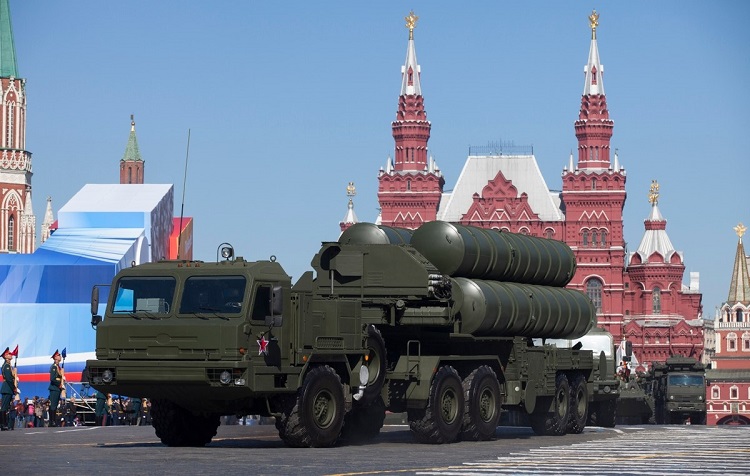India and Russia to sign S-400 Missile deal this week
October 3, 2018 | Expert Insights

Moscow and Delhi will sign a deal worth more than $5 billion on the delivery of Russian S-400 anti-aircraft missiles when President Vladimir Putin visits India later this week.
Background
India has long maintained cordial relations with Russia since Independence through a non-aligned strategy. This neutral approach has been observed in contemporary times when India abstained from voting against Russia on the Crimean issue, while Russia supported India’s bid to join the Nuclear Supplier’s Group (NSG). Diplomatic ties are secondary to Russia’s pivotal role in India’s defence sector with the former providing 62% to Indian arms in the past 5 years.
The S400 (NATO call name SA 21 “Growler”) is an impeccable piece of defence machinery with multifunction radars, anti-aircraft missile systems and launchers more efficient than the American Patriot system. Three types of missile deployment provide for layered defence. The Indian forces are operating at 3/4th of their potential making the deal imperative for defence against hostile neighbours.
Russia currently has harsh sanctions imposed on military exports by Washington under the Countering America’s Enemies Through Sanctions Act (CAATSA). Under CAATSA sanctions, countries trading with the sanctioned country are also eligible for sanctions, meaning any country buying weapons from Russia could also be sanctioned by the US.
Analysis
Russia and India are set to sign a deal worth more than five billion dollars on the delivery of Russian S-400 missile systems to New Delhi, according to the Kremlin.
Russian President Vladimir Putin will oversee the agreement during his trip to India this week, top Kremlin aide Yuri Ushakov said on Tuesday. "The key feature of this visit will be the signing of the agreement to deliver S-400 air defence systems," he said. "The value of the contract will be more than five billion dollars."
Moscow has been negotiating to sell the S-400 long-range surface-to-air missiles to India for months.
The sale has irked the United States, India's defence partner, which has wanted to wean India off Russian technology.
The US has imposed sanctions on Russia for its annexation of the Ukrainian peninsula of Crimea, which means any country that engages in defence or intelligence sharing with Russia could also be subject to sanctions.
A senior Pentagon official said in August that sanctions against India would come under consideration if its purchase goes through.
India has signalled it will ask Washington for a special waiver from sanctions, though a US official last week said there is no guarantee it would do so.
The S-400 missile system is a state-of-the-art weapons platform with a maximum range of 400km, considered one of the best defence systems in existence.
The acquisition of the S-400 system would be the latest in a long series of Indian defence purchases, as the country has previously bought combat planes, ships and submarines from Russia.
India is not the only country buying the air defence systems from Russia. Other countries such as China, Turkey, Saudi Arabia and Qatar have all bought or are planning to buy the anti-aircraft missile weapon.
US military officials and politicians have also expressed concerns over Turkey's intention to buy the Russian missile system. Despite these threats, Russia has said the supply of the missiles to Qatar will continue, with Qatar's Foreign Minister Mohammed bin Abdulrahman Al Thani saying acquiring the system is a "sovereign" decision. Meanwhile, Russia's defence minister said on Tuesday that the delivery of a modern S-300 system to bolster Syria's air defence has been completed.
Counterpoint
Although India has been looking to get a waiver from the CAATSA sanctions for the S-400 deal, it looks unlikely Washington will provide one. Japan, which is the US’s permanent ally, was refused a similar waiver for importing Iranian Oil.
Another pressing issue is India’s decision to purchase this missile system will lead to its over-dependence on a single original equipment manufacturer (OEM). Currently, Russia supplies close to 70% of India’s defence requirements, including combat aircraft, frigates, helicopters and tanks. Considering that the S-400 missile system will become the mainstay of the army/airforce’s anti-aircraft battery, it is counterproductive to have just one foreign supplier.
Assessment
Our assessment is that India’s vulnerabilities on the twin borders with Pakistan and China necessitate the acquisition of a strong air defence system. This is especially relevant for the Indian air force as they need to protect their air bases. By inking this deal with the Russians, India may risk being affected by the US sanctions under the Countering America’s Adversaries through Sanctions Act or CAATSA. We believe that Washington may be mindful of India’s strategic requirement and could exempt India from CAATSA in specific deals with Russia.








Comments